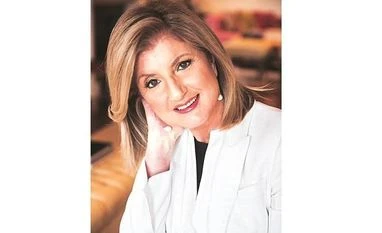Dressed in a white jacket, trousers and silver-coloured sneakers, Arianna Huffington, co-founder and former editor-in-chief of Huffington Post, has just flown back to Mumbai from Udaipur after having attended the biggest Indian wedding of the year. Here, she is maximising her time by meeting with her partners and building alliances for her latest initiative Thrive Global, a health and wellness platform.
Huffington, a self-described Indo-phile, in her mid-60s speaks slowly but surely with a heavy Greek accent as she details how Thrive Global is comprised of three parts: The business-to-business (b-2-b) bit that helps companies focus more on turnout as opposed to "running on empty"; a media platform for consumers that has content, which brings users the latest scientific data on how to engage in holistic health, with wisdom from the ages that's validated by modern sciences and new role models. The third includes multiple digital products or basically a software ecosystem based on a SAS model, which will be launched next year.
Does that mean she’s done with journalism? “Thrive is very much journalism,” Huffington points out quickly. “We write, do videos, and make comments about what is happening politically but from a different perspective.”
So in the US can you live with the constant cycle of outrage without burning out is the tack she would take emphasising she does step into news but from a Thrive angle. An example is when Tesla Founder Elon Musk started tweeting in the middle of the night when he was running on empty and it led to an SEC investigation, he had to step down as Chairman of the company, Huffington wrote an open letter to him, which then became a teachable moment, she says.
Her open letter to Musk talked about sleep deprivation and slowing down. Of course, Musk responded in typical fashion by saying that slowing down was not an option. Uber is another example. The culture in the end was fuelled by burnout and that made it hard, despite all the amazing work that all the firm had done, to be sustainable. "Culture is like a company's immune system," Huffington says.
Huffington, who first came to India when she was 17 to study Comparative Religion at Visva Bharati Santiniketan, remarks that’s where she learned to wear saris but it also formed the foundation for other Eastern sensibilities such as yoga, a compassionate approach to building corporate culture, a spiritual approach to life and so on.
For a media entrepreneur, who ran the first online news site that won the Pulitzer to turning dotcom entrepreneur and selling to AOL to restarting her journey with Thrive, what keeps her ticking? “I love seeing where the world is going and where the world needs to go and HuffPost was a company that was built on us understanding that the world is moving online, and yet there wasn't a full-blown digital publisher which is what we became.”
She left HuffPost because she felt the world needed to move away from the delusion that to be successful one had to be fuelled by stress and that burnout was part of that.
Her goal remains the same: to accelerate cultural shifts. Broadly where does she see the future of media headed? Digital is still the future, she says. “Still and forever.” Magazines and TV will continue with niches but the heart of the audience is digital.
While those who know her well describe Huffington as flawlessly consistent she does blow her top from time to time. When she gets angry, it's child-like. Which means five seconds later, it's all forgotten. She’s also a stickler for fixing problems immediately. Tell her you're sick and in less than 30 minutes she will insist you see a doctor. It’s not “you should see a doctor, it is I'm calling my doctor and you will go see him in 30 minutes," remarks a Thrive colleague. In other words, her worldview is the second that there's a problem, course-correct and see what can be done to fix it.
In 2016, Huffington wrote the book "The Sleep Revolution", which drives home the virtues of quality sleep. The science is conclusive, she points out, adding only 1.5 per cent of the population has a genetic mutation that lets them get by with four hours of sleep.
"I'm an eight- hour girl myself," she says, and the vast majority of the population needs anywhere between seven and nine hours of sleep. One metaphors for sleep is a laundry machine.
Start a great cycle but take the clothes out early and the cycle isn't complete and the brain during sleep undergoes multiple cycles: deep sleep, light sleep, REM sleep, the whole thing, in order for it to work well and it’s very active and dynamic because the brain is purging toxins, executing other complex functions.
How would Huffington describe her biggest missteps? “They have been hiring mistakes," she says. “I am very clear now that I wouldn't do interviews or hire candidates if I'm jet-lagged or haven't slept fully. If tired you are more likely to make mistakes, and miss the red flags and more likely to want to go to yes so you can just check one more thing of your list.”
Did she get enough sleep the last night, I ask? Amidst laughter, the answer is "I took the early flight back from Udaipur, so yes and I'm very well rested today."
Unlock 30+ premium stories daily hand-picked by our editors, across devices on browser and app.
Pick your 5 favourite companies, get a daily email with all news updates on them.
Full access to our intuitive epaper - clip, save, share articles from any device; newspaper archives from 2006.
Preferential invites to Business Standard events.
Curated newsletters on markets, personal finance, policy & politics, start-ups, technology, and more.
)